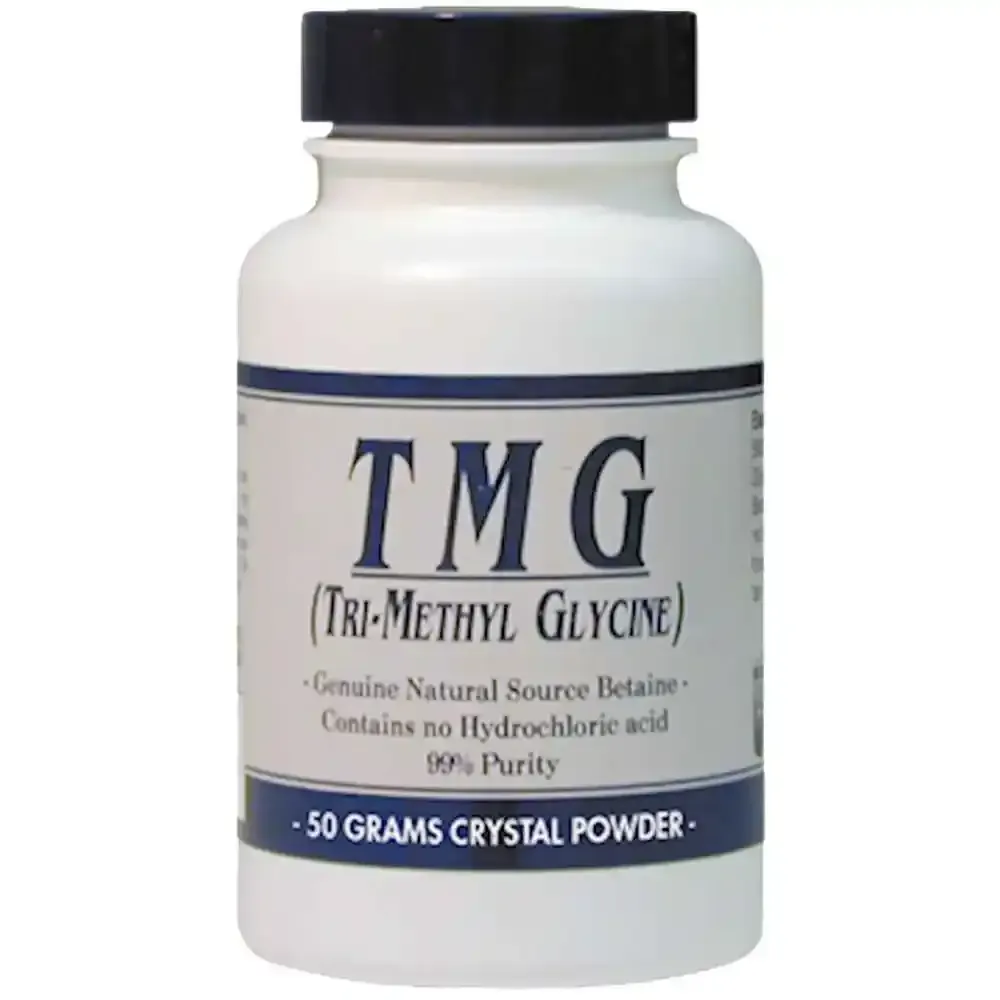Bio-Nutritional Formulas – TMG (50 Grams)
Bio-Nutritional Formulas – TMG (50 Grams)
Bio-Nutritional Formulas TMG (Trimethylglycine) is a natural methyl donor derived from a pure source. It plays a vital role in methylation, a process that detoxifies homocysteine by converting it into methionine, an essential amino acid. During this process, TMG donates a methyl group, resulting in the formation of Dimethylglycine (DMG), which helps support energy production.
Features:
- Promotes energy support
- Contains a genuine natural source of betaine
- Free from hydrochloric acid
- 99% Purity
Ingredients and Specifications
| Ingredient | Amount |
|---|---|
| Trimethylglycine (amino acid)(from beets) | 500 mg |
This product contains 99% pure Tri-Methylglycine (TMG) amino acid, also known as Betaine, derived from beets. It does not contain Betaine Hydrochloride, which is present in some products claiming to be Trimethylglycine.
Guaranteed Free of: Corn, soy, yeast, wheat, egg, sugar, salt, milk, artificial colors or flavors, and preservatives.
Dosage
• Use 1 to 3 scoops (provided) daily with or between meals.
• 1 level scoop = 500mg
• 5 scoops = 1 teaspoon. • Scoop provided.
• May be taken with water or other liquids, or added to cereals
Warnings
If you are pregnant, nursing, taking any medication, or have a medical condition, please consult your healthcare practitioner before taking any dietary supplement. Discontinue use and consult a doctor if any adverse reactions occur. Keep out of reach of children
*These statements have not been evaluated by the Food and Drug Administration. This product is not intended to diagnose, treat, cure, or prevent any disease.
If you are interested in getting program recommendations from an Herbalist, click here to submit the client questionnaire.
Benefits of TMG (Trimethylglycine) for Individuals with Methylation Challenges
Trimethylglycine (TMG), also known as betaine anhydrous, is a potent methyl donor essential for supporting the body’s methylation processes. For those with genetic variations—particularly in the MTHFR gene—TMG offers targeted nutritional support to help overcome methylation hurdles and promote optimal cellular health.
Understanding Methylation and Its Importance
Methylation is a vital biochemical process involving the transfer of methyl groups (–CH₃) to various molecules in the body. It plays a key role in:
- DNA repair and gene expression
- Detoxification pathways (including homocysteine metabolism)
- Neurotransmitter synthesis and balance
- Energy production
- Hormonal regulation
When methylation is impaired—often due to mutations like MTHFR—the body may struggle to produce enough methyl donors. This can lead to elevated homocysteine levels, sluggish detoxification, mood disturbances, fatigue, and increased disease susceptibility.
How TMG Supports Methylation
TMG supplies three methyl groups per molecule, making it one of the most efficient natural methyl donors. It primarily supports methylation through the BHMT (betaine-homocysteine methyltransferase) pathway, an alternative route that converts homocysteine to methionine independently of MTHFR activity.
Key Benefits for Those with MTHFR or Methylation SNPs:
| Benefit | Description |
|---|---|
| Lowers Homocysteine | Facilitates conversion of homocysteine into methionine, reducing cardiovascular and neurological risks. |
| Bypasses MTHFR Defects | Supports methylation even when folate metabolism is compromised due to MTHFR mutations. |
| Supports Mood and Neurotransmitters | Enhances synthesis of dopamine, serotonin, and norepinephrine, aiding emotional well-being. |
| Enhances Detoxification | Strengthens phase II liver detox pathways, aiding in toxin removal. |
| Improves Energy and Focus | Supports mitochondrial function and ATP production, boosting vitality. |
| Supports Liver Health | Aids in lipid metabolism and may help reduce fatty liver issues. |
Who Can Benefit from TMG Supplementation?
- Individuals with MTHFR, COMT, MTRR, or CBS genetic mutations
- Those with elevated homocysteine levels
- People experiencing brain fog, fatigue, or mood imbalances
- Individuals exposed to high levels of toxins or under stress
- Anyone aiming to improve liver function and cellular repair
Final Thoughts
TMG provides a safe and effective means to enhance methylation, especially for those with genetic obstacles. When used alongside supportive nutrients like methylated B12, folate (5-MTHF), and B6, TMG can help restore biochemical harmony and support long-term health.
Always consult a qualified healthcare professional before starting any new supplement, particularly if you have a methylation disorder or are taking medications that influence methylation or homocysteine levels.
Frequently Asked Questions (FAQ)
Q1: What is TMG (Trimethylglycine) and how does it support methylation?
A: TMG, also known as betaine anhydrous, is a natural compound that donates methyl groups essential for methylation processes in the body. It primarily supports methylation through the BHMT pathway, helping convert homocysteine into methionine, which promotes cellular health, detoxification, and neurotransmitter synthesis.
Q2: Why is methylation important for health?
A: Methylation is a critical biochemical process involved in DNA repair, gene expression, detoxification, neurotransmitter production, energy generation, and hormonal regulation. Proper methylation is vital for maintaining overall health and preventing disease.
Q3: Who can benefit from taking TMG supplements?
A: TMG may benefit individuals with MTHFR, COMT, MTRR, or CBS genetic mutations, those with elevated homocysteine levels, people experiencing brain fog, fatigue, or mood issues, individuals under high stress or toxin exposure, and anyone seeking to improve liver function and cellular repair.
Q4: How does TMG help individuals with MTHFR mutations?
A: TMG supports methylation through an alternative pathway, bypassing the need for MTHFR activity. This helps lower homocysteine levels and supports methylation even when folate metabolism is compromised.
Q5: What are the main benefits of TMG supplementation?
A: TMG can help lower homocysteine levels, support mood and neurotransmitter production, enhance detoxification, improve energy and focus, and promote liver health and lipid metabolism.

